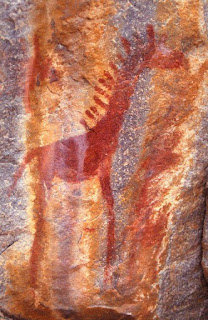This weekend's guest blogger is the talented duo of Michael Sears and Stan Trollip, known jointly as Michael Stanley. I first met them in a bar at Bouchercon years ago, and have loved their Detective Kubu series ever since.
 |
| Michael Sears |
 |
| Stanley Trollip |
We’ve always been fascinated by the Bushman cultures. We have a great admiration for how they survive in the harshest environments and for the unselfish aspects of their group behavior. Botswana, Namibia, and the Northern Cape of South Africa are the remaining areas where their descendants can be found and their languages can still be heard from native speakers. So when we decided that our mystery series would be set in Botswana, we wanted the Bushmen to play a role.
It’s a challenge to feature a culture so different from one’s own in a novel, and when we started researching the Bushmen, we read everything we could get our hands on. However, we encountered many obstacles. Not only are there few representatives of their nomadic culture still alive, but the Bushmen don’t have a written history - they pass on their culture through stories and songs told around the camp fire. Although there has been much written about them, starting with the work of anthropologists in the nineteenth century, it was frustrating to find contradictory interpretations. Unfortunately, most of the historical writers couldn’t speak a Bushman language and sometimes came to conclusions that may have been based on miscommunication.
Still, there was a huge amount that could be learned. Many of their tales have been recorded, and although much of this is myth, their values come through strongly. Also, there is a powerful record of Bushman life and beliefs in the wonderful rock art that survives throughout southern Africa. The most remarkable site is at Tsodilo Hills in northern Botswana near Shakawe, where the new Detective Kubu mystery, A Deadly Covenant, takes place. The Bushmen regard this as the birthplace of humankind. Today, it is a World Heritage site boasting over three thousand rock paintings, some of which go back thousands of years.
 |
| Eland |
 |
| Giraffe |
Much of the area where the Bushmen lived is arid, including the vast Kalahari Desert. For tens of thousands of years, their ability to survive in this harsh environment depended on a number of factors. They were skilled at discovering subsurface water and food sources. Their groups were small, seldom more than a dozen, so they didn’t need a lot of food for the group to survive. Importantly, they believed that resources belonged to everyone and had to be shared, so if they came across some water, for example, they would take a drink but always leave some for the next group. In fact, they didn’t believe in ownership at all.
However, European and the local black cultures did, and as they and their animals moved into the territories the Bushmen used, clashes were inevitable. A Bushman would come across a cow, for example. It was much easier to kill it, because it didn't run away, than to run for several days after an antelope they’d shot with a poisoned arrow. The farmer thought differently and would either kill or enslave the Bushman if he caught him.
 |
| Bushman with hunting kit |
Over time, the nomadic Bushmen in Botswana retreated into the Central Kalahari, but even there they faced conflict. The government of Botswana wanted them to settle so that it could supply them with water, schools and other resources guaranteed by the constitution, and convert the central Kalahari into a huge nature reserve. The Bushmen wanted to decide their own lifestyle. Eventually, in 2006, the High Court in Botswana confirmed their right to continue to live in the Central Kalahari Game Reserve, but exempted the government of its usual responsibilities for them. The seduction of town life with the supply of at least some resources encouraged many of them to move to the recently built town of New Xade, a sad place where people have little to do but raise scrawny goats.
 |
| Starting a fire |
Bushmen made their first appearance in our debut novel, A Carrion Death. It’s Kubu's Bushman school friend who teaches him to be observant and sets him on the path to becoming a detective. We liked their presence so much that we made them the focus of our third book, Death of the Mantis, whose backstory is the demise of the Bushmen and the struggle of the remaining ones to maintain their history and traditions. The book seemed to strike a chord with readers, and was short-listed for an Edgar Award and won a Barry Award. Bushmen featured again in Dying to Live, and play an important role in our new book, A Deadly Covenant.
One of the attractions of Botswana as a setting for novels is the clash of cultures. Although it is a well-managed country, genuinely trying to uplift its peoples, there remains a struggle between old and new. It accepts new ideas and technology, but old beliefs and prejudices run deep. The Bushmen sometimes find themselves trapped in that interface.
Synopsis and bio
While digging a trench for a new water project, a contractor unearths the skeleton of a long-dead Bushman. Kubu and Scottish pathologist, Ian MacGregor, are sent to investigate and MacGregor discovers eight more skeletons. Then an elder of the village is murdered, and things become still more complicated when a mysterious Bushman appears at the massacre site, collapses, then disappears again, but seems connected to the murders in some way.
Accusations of corruption are levelled at the water project, and international outrage over the massacre of the Bushman families builds. But how do the recent murders link to the dead Bushmen? As Kubi's team investigate, they uncover a deadly covenant made many years before, and they begin to fear that their own lives may be in danger.
Michael Sears and Stanley Trollip write under the name Michael Stanley. Michael has lived in South Africa, Kenya, Australia and the US. He now lives on the Cape south coast of South Africa. Stanley splits his time between Minneapolis, Cape Town, and Denmark. They have written eight books in the Detective Kubu series and a thriller concerning rhino poaching and rhino-horn smuggling in Africa. Discover more about Michael Stanley and their books at:
www.facebook.com/michaelstanleybooks



